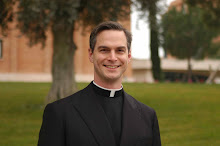
Q: I was just listening to a radio show about redemptive suffering - they were saying that our suffering can have value if we "offer it up." Is there any more to this (uniting our sufferings to Jesus') than just saying the words?
A: Before getting to the heart of this question, we have to peek at the presupposition. It has to do with a theological concept called merit.
Part I: The Mystery of Merit
Merit is the right to a reward. Someone who gains merit deserves a reward from others; they have earned something of value through their own efforts; someone else owes them a recompense as a result of what they have done. A worker merits his wages; a football player whose performance launches his team to victory merits recognition as the most valuable player; soldiers who risk their lives for their country merit respect, and also social security when their time of active duty is up.
Jesus spoke often about merit. In his Sermon on the Mount he encourages us to look forward to the reward that will be great in heaven. In his parables about the final judgment he draws a direct correlation between how we behave here on earth and the reward that we will receive in eternity. Our modern sensibilities, influenced by a Kantian worldview, are disturbed by the thought of doing what is right in order to receive a reward. Jesus had no such qualms: "Get yourselves purses that do not wear out, treasure that will not fail you, in heaven where no thief can reach it and no moth destroy it" (Luke 12:33).
In short, as Christians, our prayers, actions, and sacrifices serve as conduits, in a sense, of God's grace. And it is God's grace that redeems fallen humanity, rolls back the forces of evil, enlightens sin-darkened hearts, restores hope to those in despair, fills us with joy, wisdom, and strength... God's Kingdom flourishes, in individuals, families, parishes, and societies, when the flow of grace is abundant. To increase our merits is to do our part to increase the flow of God's grace in, through, and around us.
Problem and Solution
Now for the tricky part. On our own, we are absolutely incapable of obtaining supernatural merits. This is because we are fallen, sinful human beings. An unplugged lamp won't give off any light, no matter how many times you turn the switch. Similarly, original sin unplugged our souls from the source of grace - God himself. When Jesus became man and offered himself in atonement for our sins, he plugged human nature back in to God, so to speak. This was the redemption. And so, anyone who is united to Christ through faith and the sacraments is now once again connected to the source of grace - they are living in the state of grace. Only in Christ, then, can we merit: "I am the vine, you are the branches. Whoever remains in me, with me in him, bears fruit in plenty; for cut off from me you can do nothing" (John 15:5).
But that's the amazing thing: in Christ, we can merit. God has consciously chosen to give us the possibility of making a difference in his Kingdom. We are not just along for the ride. What we do and how we choose to live our ordinary lives can actually increase the flow of grace in the world, spreading Christ's Kingdom and storing up treasure for us in heaven. Jesus has not only saved us from damnation, but he has given us the possibility of becoming active, meritorious collaborators in the work of redemption. Not because we deserve it, but simply because he generously wanted to give us that possibility: he wanted our lives to have real meaning, our actions and decisions to have eternal repercussions. His love makes us friends and collaborators, not just his robots or spiritual trophies.
Though it may seem obvious, we should mention that no one can merit the initial grace of conversion for themselves. The unplugged lamp can't plug itself in, though once plugged it really is the lamp that shines. A misunderstanding of this point helped fuel the fire of dissention that sparked so many painful divisions among Christians at the time of the Protestant Reformation. We cannot save or redeem ourselves; we need a Savior, a Redeemer: Christ. But on the other hand, once we have accepted Christ's gift of grace, that very gift enables us to merit other graces for ourselves and for the Church. This is a marvelous, wonderful, and underemphasized part of the Good News!
Now we are ready to tackle the question of whether it is enough just to "say the words" in order to win merit by uniting our sufferings to Christ. We'll look at that next time.
Yours in Christ, Fr John Bartunek, LC


I am looking forward to the next few parts of this series. I think about how St. Ignatius of Loyola offered up his lack of sleep as mortification. Used to be I would wake up at 3am and I attributed this to St. Faustina prompting me to say the Divine Mercy Chaplet. Now that I am studying St. Ignatius, seems I wake up at all hours of the night. Based on what I have read, certainly someone can benefit from these sleepless nights I am tormented with!
ReplyDeleteFather John you have such a wonderful and natural way of deciphering in terms that even the most spiritually immature of us Christians can understand as we seek to strengthen our relationship with Christ. You have been a conduit for me personally that has enlightened and enabled me to continue to seek in a way that is understandable and unintimidating at this early stage of my journey. Thank you, for all you do and God Bless! JT
ReplyDelete